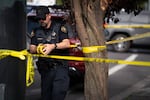Portland and the U.S. Department of Justice have reached an agreement on a proposed new section to the 2014 settlement agreement guiding the city police bureau’s use of force. The proposal lays out steps to bring the city back into compliance with the settlement, and paves the way forward on a number of thorny issues the city, police union and federal prosecutors have been trying to resolve since the city fell out of compliance in April 2021.
Among the steps laid out in the court filing submitted Monday, if the proposed changes are adopted, the city will have just over six months to implement a police body-worn camera program. The city is currently negotiating the specific policies around that program in mediation with the Portland Police Association, the union representing rank and file officers.
Body-worn camera policies have been a major sticking point between the police union and the city as the two try to reach a contract agreement. The union proposed policies allowing officers to review footage before writing their reports and sought restrictions on who has access to camera footage.

Portland police cordon off a neighborhood after an officer shot and killed Alexander Tadros, 30, while assisting the Drug Enforcement Agency on Aug. 27, 2021 in Portland, Oregon.
Jonathan Levinson / OPB
City attorneys negotiating the union contract have also had to contend with increasingly impatient federal prosecutors who outlined their desired policies in a November letter to the city.
“When an officer uses force, the officer shall not review any BWC recordings before reporting the force ... and completing all other reports associated with the same incident,” the DOJ letter recommends. “After completing their required reports, a member may review any BWC recording associated with the incident and prepare separate supplemental reports with additional information.”
In the proposed amendments, federal prosecutors and city attorneys agreed that the federal government has the right to review those policies and, if DOJ attorneys don’t think the policies are adequate, the federal government will take the city back to federal court.
In a hint the union may be softening its stance on body cameras, according to Monday’s filing, PPA does not object to that arrangement.
Monday’s proposed additions to the settlement agreement would also resolve persistent questions around who will be held accountable for use of force violations during the 2020 protests. The city initially said it was not feasible to investigate and hold officers and sergeants accountable for use of force incidents related to racial justice protests due to the overwhelming number. Instead, the city planned to limit accountability to lieutenants and above.
Federal prosecutors appear to have forced the city’s hand. Monday’s proposal would give the city 60 days to begin work identifying lieutenants and above who failed to properly train and oversee use of force during the 2020 racial justice protests.
According to the proposal, the internal police review and police bureau would also need to “investigate any sworn member if … information is discovered suggesting that any sworn member may have violated PPB policy or this Agreement.”
As part of the proposed additions, federal prosecutors are kickstarting what has been a slow start to the transition from the Independent Police Review to a voter-approved community oversight board. City Council and the Portland auditor would be required to each submit a plan to transition from IPR to the new community oversight board. The DOJ would then determine which plan should be adopted.
In an interview before the ballot measure passed, Commissioner Jo Ann Hardesty, who spearheaded the initiative, said a commission would be given 18 months to figure out the specifics of how it will operate. After a slow start, that commission was seated in July. If the new agreement with the Justice Department is approved by City Council, the 18-month clock will start ticking on a DOJ enforced timeline at the end of which the commission will recommend changes to city code.
From there, the city would have 60 days to present the proposed changes to the U.S. government and U.S. District Judge Michael Simon, who oversees the police settlement agreement. Once approved, City Council would vote on the amendments and then will have a year to stand up the oversight board.
If the entire process goes as scheduled, Portland residents will see the oversight board assume its duties four years after they passed the change at the ballot.
Portland City Council is expected to hold a public hearing on the proposed settlement agreement changes Jan. 26. If City Council approves the amendments, Simon will schedule a hearing before formally adopting the changes.


